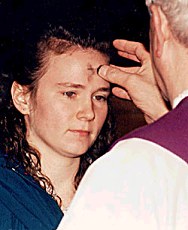 Ash Wednesday is a day of special devotion; the day which marks
the beginning of the holy season of Lent, a period of spiritual discipline,
fasting and moderation in preparation for Holy Week and Easter; one of the most
important days of the church year. In the Ash Wednesday service, ashes are lightly
smeared onto the forehead of a person by the priest or bishop.
Ash Wednesday is a day of special devotion; the day which marks
the beginning of the holy season of Lent, a period of spiritual discipline,
fasting and moderation in preparation for Holy Week and Easter; one of the most
important days of the church year. In the Ash Wednesday service, ashes are lightly
smeared onto the forehead of a person by the priest or bishop.
Three traditional expressions of penance are fasting, prayer, and almsgiving. We see these three mentioned by Jesus in Matthew 6:1-6 and 16-18, the gospel reading for Ash Wednesday. Fasting, prayer, and almsgiving remind us that conversion includes every aspect of our lives.
Fasting reminds us that conversion affects every part of us. Conversion is not just saying 'I believe in God'. My whole body belongs to God and is to give glory to God. Life is not just for seeking my own pleasure. "The body is not for immorality, it is for the Lord!" (1 Corinthians 6:13) reminds us that conversion affects every part of us.
Prayer reminds us that conversion involves our relationship with God. If God is first, then we must take time with Him. Prayer reminds us that our time belongs to God. At times we may be busy. However it is when we are most busy that we most need time with God in prayer.
The first great commandment is that we love God will all our heart and mind and strength. Some people say they love God but never have time for prayer. Some people find time for everything else except God. If we say we love God but do not take time with Him, then we are fooling ourselves. We are fooling ourselves but not God. It is obvious to God and everyone else where our priorities lie.
Almsgiving reminds us that our interior conversion must express itself in our relationships with others. It also reminds us that our possessions are not totally our own. Our possessions come from God and we will have to give God an accounting for how we have used them. If we waste money on unnecessary things while people around us are needy, then we must answer to God (see Luke 16:19-31). Not only must we be willing to share our money and resources with the needy. We must also be willing to give of our time and attention. Sometimes this is more meaningful than money.
Acknowledgements:
Text adapted from
Anglican Glossary,
Catholic
Network
Image from Woodford
County High School (UK)